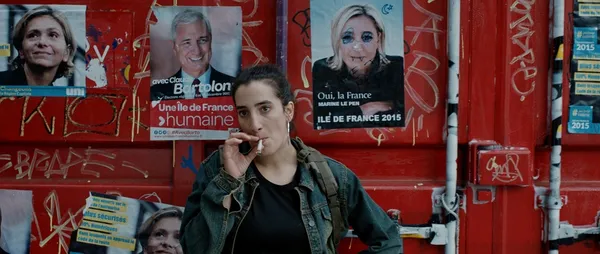Eye For Film >> Movies >> You Resemble Me (2021) Film Review
You Resemble Me
Reviewed by: Jennie Kermode

Hasna Aït Boulahcen hit the headlines when she died in the early morning of 18 November, 2015. It was reported that she was a suicide bomber, but forensics experts subsequently concluded that this was not the case; a man in the same room had blown himself up, and she had suffocated under the rubble. Detectives believe that she aided and abetted the men responsible for the terrorist attack on the Bataclan - but who was she, and how did she get into that situation?
In making this film, which is based on known events in Hasna’s life and informed by more than 300 hours of interviews with members of her family, director Dina Amer has stressed that she was not seeking to justify her choices, just to understand. There is no suggestion that Hasna was not responsible for what she did, nor that she couldn’t understand it, but the picture that emerges is of a deeply damaged person who never received the help she desperately needed; and of a catalogue of bad decisions and missed opportunities on the part of others, attention to which might reduce the risk of other people being radicalised in the future.

The film opens when Hasna is a child (played by Lorenza Grimaudo), completely inseparable from her sister (Ilonna Grimaudo) and proud of the fact that they look like twins. As they are neglected by their mother, she tries to look after the younger, less assertive girl, and this includes periods of roaming the streets together, sleeping wherever they can find shelter, and stealing food from market stalls. Naturally, this draws the attention of the authorities, and the girls are separated and sent to different foster homes. For Hasna, it’s as if the whole world has fallen apart.
Both girls deliver exceptional performances in this powerful opening section, and if the film struggles to make the same impact afterwards, that serves to bring Hasna’s loss into sharp relief. The energy and freshness of the girls’ adventures is engrossing, and Amer uses a lot of handheld camerawork, showing us the world from their perspective. The cruelty to which they are subjected by their mother also leaves quite an impression, but it’s just the start of a series of degrading experiences for Hasna. Racism is a constant background presence. Her foster mother straightens her hair, tries to make her eat pork, and even changes her name.
None of it sticks. By the time we meet her again, as a young woman (Sabrina Ouazani), she’s rebelled as many people with such experiences do. She’s surviving by selling sex, but seems to have little control over the process, and treats violence from the men around her as an unavoidable fact of life. Despite this, she retains a tenuous hold on her Muslim identity. When a Muslim man she doesn’t know steps up to defend her at an unexpected moment, it’s a reminder that there is friendship and community there for her if she can reach out, but she’s been fighting for so long that she seems unable to respond to this alien kindness.
Amer herself takes on the role in its final stage, at which point Hasna seems to have become unreachable – brittle, defensive, prone to making statements which she knows will shock. She has only recently taken up the hijab, but wears it less as a symbol of community than as a shield against the world, or a statement. Still, she is not a terrorist. There are moments of doubt, moments when all the old internal terror rises to the surface. When this happens, her cousin reassures her that the path she is on will restore her purity and bring her back to Allah. The words are positive but the message is clear: that she is broken, shameful, morally corrupt. Looming over her, he doesn’t seem so different from the men who beat her, or from her mother.
What are we to make of all this? If one thing emerges, it’s that the anger which may have led Hasna to do what she did was not a sudden thing, a product of radicalisation, but something which was always present within her, albeit sometimes directed internally. Amer ends the film with a brief foray into documentary which brings the reality of the story back into focus. Hasna’s family took part because they wanted to clear her name of the suicide bomber allegation. What it achieves is to look beyond the moment on which she has previously been judged, reminding us that who she was extended beyond that in both time and space, and that none of us is an island.
Reviewed on: 02 Feb 2023

















